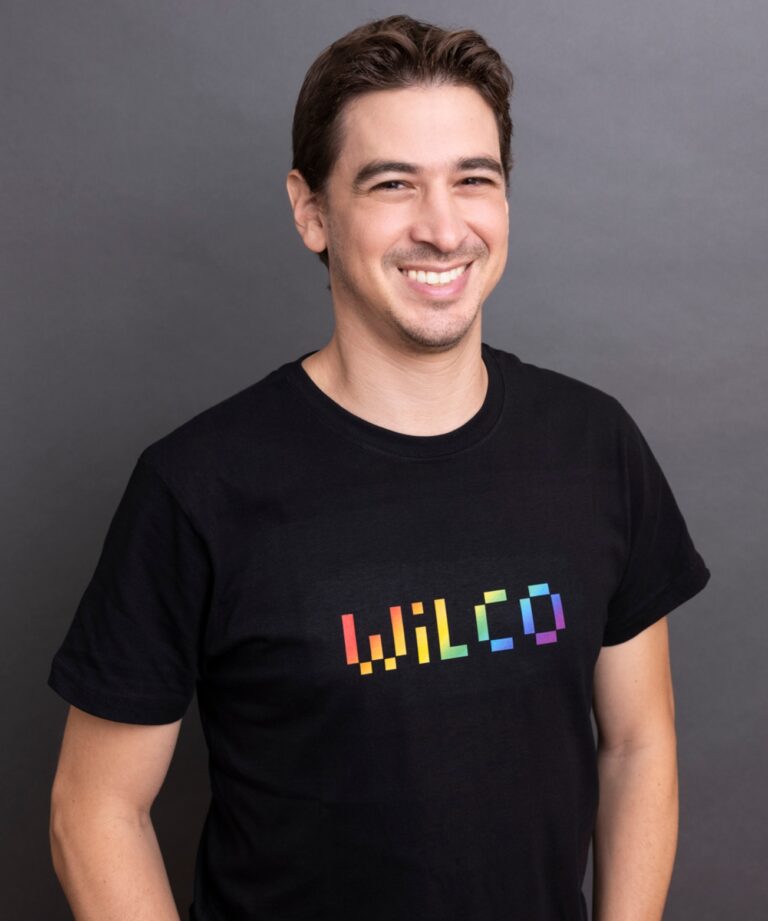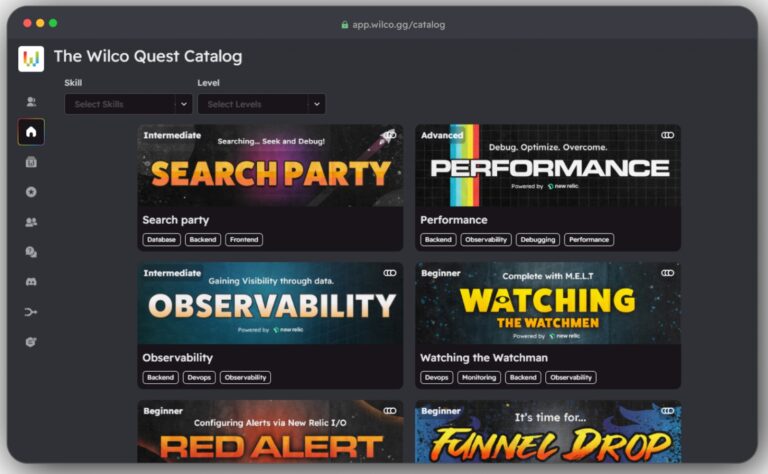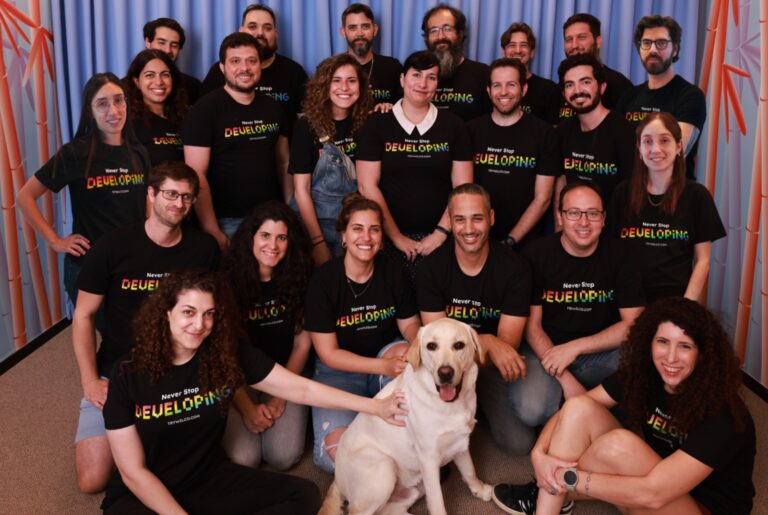It’s called “dry-water” – a canister with evaporated water. All you have to do is “just add water.”
It’s available from AnyThink.market, where you can also find a saltshaker shaped like a urinal, the “slay-nana” plastic banana slicer, a bulletproof shot glass, organic sawdust in a bag, roast beef bath bubbles, and – wait for it – a yodeling pickle.
These fake products are whimsical simulations from a fantasy company created by Wilco, the Tel Aviv-based startup that helps software companies hire and upskill their existing staff.
Wilco calls its simulations “quests,” named after the popular 1980s video game Space Quest. The name of the company comes from “Roger Wilco,” where “Roger” is an acknowledgement that the messages were received, and “Wilco” is short for “will comply.”

On Freund started Wilco in 2021 with partners Shem Magnezi, CTO, and Alon Carmel, CPO, after they realized that most software training programs “focused on theory or how to write code,” Freund tells ISRAEL21c.
“But there’s so much more for a software engineer. There are many hard and soft skills that you can master only through experience. We built Wilco to accelerate the pace an engineer can gain those experiences in a safe way where they don’t have to worry about creating a production outage for two hours.”
Indeed, most of Wilco’s competition fall into two camps, Freund explains.
“One is traditional onsite training where you bring in a consultancy firm and they charge you $100,000 for the week. But that doesn’t really scale and the cost is very high. Alternatively, you have online classes and courses which are more down-to-earth in terms of pricing and are very scalable, but they focus on theory rather than practical experience. We want to give the level of a good onsite training at the scalability and price point of an online course.”

As important as coding is, Freund says, “everyone gets so distracted by that as a skill, they forget everything else.”
He gives the example of a man who worked in sales for 20 years and couldn’t find a programming job, even as a junior developer, since he had never worked on large codebases or with a team.
After practicing these skills on the Wilco platform “without fear of breaking something,” Freund notes, the ex-salesperson is now gainfully employed as a full-stack developer.
Optimize skills
Why are skills other than coding so important?
“I’ll give you an example from the world of medicine,” Freund says.
“If you want state-of-art knowledge, go to a recent medical school graduate. But if you need someone to operate on your shoulder, go to someone with 15 years’ experience. Most startups haven’t understood this lesson. They’re still trying to optimize for knowledge, not skills.”
Another Wilco advantage: You don’t have to spend years or decades mastering a skill. “Practice may make perfect, but you don’t have to wait for it to happen organically,” Freund says. “You can create your own practice opportunities.”
Wilco’s simulations are not so much about “fixing” a problem (“anyone can learn that in college or a bootcamp or even an online course,” Freund says), but demonstrating how an engineer tackles a problem.
“How do you even know there’s something wrong in production? What do you do when you find out? Do you go for a quick and dirty fix or something more meaningful?”
Another downside to typical learning and development tools is that they tend to focus participants on practicing a single skill at a time, but Freund stresses the multifaceted nature of programming work, which must include such tasks as logging data, monitoring, analytics, and load balancing a network’s infrastructure.
“Wilco’s platform also allows engineers to practice skills like team communication and responding to a crisis,” Freund adds.
A remarkable year
Wilco is focusing currently on training for full-stack developers, although the company will add more types of engineering in the future, Freund says, such as mobile and games.
It’s been a remarkable year for Wilco, which had its first product out the door just six months after launching in September 2021.
“We have thousands of active users every month and several paying customers,” Freund tells ISRAEL21c.

Engineers can use the product for free – either at their place of work or to improve their skills independently – while companies pay Wilco a licensing fee starting at around $50 per developer per month.
Wilco is operating in a market the company estimates as being worth $37 billion. That number refers to the investment in companies making the tools used by developers to be more productive or to run their teams more efficiently — companies such as CircleCI, Armory, New Relic, Permit.io, all of which were among the first users of Wilco’s new “Quest Builder” product that allows them to create their own simulations.
Wilco itself has raised $7 million in seed funding from Hetz Ventures, Vertex, Flybridge Capital Partners and Shopify VP engineering Farhan Thawar.
Upskilling critical in current economy
Freund believes Wilco can improve employee retention.
“Developers have an intrinsic motivation to become better at their jobs,” Freund says. “We see it all the time in surveys: The opportunity for professional growth is the No. 1 motivator as to why someone stays at a company.”
The high-tech scene looks very different than it did just a few months ago. A deteriorating economic outlook coupled with inflation and a looming recession have made many companies realize that “in 2023, they won’t have the headcount they were planning on. So, it’s important to make sure their team is high performing. That’s why upskilling is so critical,” Freund explains.
Freund previously was employed by WeWork, first in the United States as VP of engineering, and then as the head of WeWork Labs in Israel. He eventually ran that division for the entire company out of Israel. He survived the “WeCrash” and left on his own terms rather than being downsized when the company ran into its well-known bout of trouble. Freund calls WeWork both “a train wreck and an amazing experience. They’re not mutually exclusive.”
Wilco was, to a certain extent, a response to the Covid-19 pandemic, which highlighted the difficulties of learning new skills when you’re not in the office.
“Software engineering is sort of an apprenticeship model,” Freund says. “Someone will be sitting next to you to help you out. That’s harder to do in a distributed environment. You can’t just tap someone on the shoulder to ask a question if you’re not physically co-located.”
Creator hackathon
Wilco has around 20 quests built so far with more on the way. The company runs hackathons, too. Recently, seven teams produced seven quests in a single afternoon.
Wilco is a helpful tool for companies looking for ways to allow their in-house developers and would-be hires to “try before they buy.” In that respect, the company lives up to its buzzy moniker, “a flight simulator for software engineers.”
“Wilco brings a novel approach to learning by replacing a dry classroom experience with an interactive, day-in-the-life story,” says Stephen Atwell, product manager at Wilco partner Armory.
Click here for more information on Wilco.














